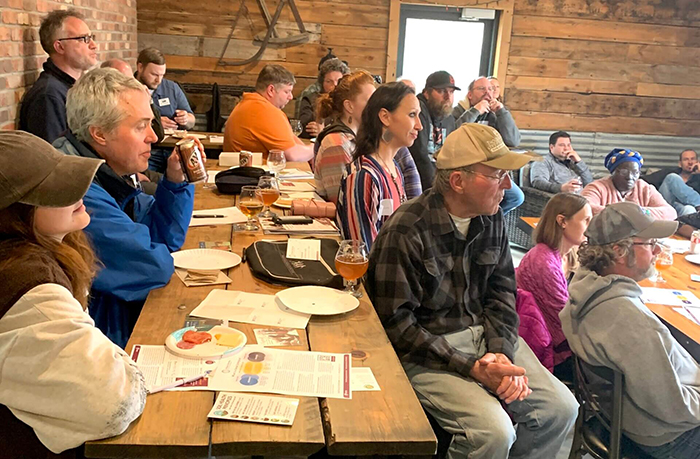Navigating sustainable farming funding in Minnesota
News | Published on June 20, 2023 at 2:44pm GMT+0000 | Author: Tucker Henderson
0
Two successful meetings held this spring by West Central Initiative and the Sustainable Farming Association have the potential to become a traveling series around the region to bring together more people interested in discussing sustainable farming.
By Benjamin Velani
Special to the Forum
West Central Initiative (WCI) and the Sustainable Farming Association (SFA) first teamed up in February to “bring beginning and current sustainable farmers an array of financial resource opportunities,” during an event at Outstate Brewing in Fergus Falls. Attendees overwhelmed the small meeting room, with more snacking on Ole and Lena’s pizza and local food from Roasted in a line that stretched nearly out to the taproom.
Due to popular demand, WCI Business Development Officer Kate Mudge and SFA Southwest Community Organizer Mary Fischer facilitated a second such event on April 26. Mudge thinks these kinds of meetings will likely become a traveling series, as it seems there’s quite an appetite for them across Greater Minnesota and even from the metro area.
What’s the appetite for?
A collegial gathering of state and regional agencies and organizations coordinating to present funding and program resources for sustainable farmers at any stage in their journey. On top of that, a free beer and pizza, charcuterie, and a host of like-minded people looking to make new connections.
“Some stayed for an hour and a half afterward to talk with each other,” Mudge said. “People seem hungry for more in-person opportunities to meet other sustainable farmers.”
“One woman I met, Jane Windsperger, a Kenyan farmer, drove all the way from the Twin Cities to attend this event,” Mudge said. “I was not expecting anybody to make that kind of a drive for this conversation. But Jane made it out with three other women. All had been farmers in Africa, and all are continuing their work in Minnesota to grow culturally specific produce that’s difficult to find. According to Jane, they’re going anywhere and everywhere to talk with and learn from other farmers, recognizing that is the way they want to learn and broaden their own practices.”
Questions and key concerns of attendees
Registration was required to ensure the number of attendees, many of whom were repeat attendees, didn’t exceed the capacity of Outstate’s event space. For the 40 folks gathered, a key issue was land access, especially for newer farmers.
Kami Schoenfeld, who works ag marketing and development for the Minnesota Department of Agriculture (MDA), talked about their down-payment assistance program to address that concern.
Others asked for success stories about diversifying a farm’s production, and how they managed it, while some were curious to hear about grazing opportunities, climate ag funding, and potential funding for much-needed equipment.
The Convener’s Perspective
The organizations presenting alongside WCI, SFA, and MDA were West Otter Tail Soil and Water Conservation District, USDA Farm Service Agency, and Mezclada. Some of the topics covered included beginning farmer opportunities, WCI’s Good Food Loan Fund, Minnesota Agriculture Water Quality Certification, and the work, programs, and community role of each of the organizations.
“These sessions were convened for the purpose of having a metaphorical one-stop-shop of organizations to share what resources, programs, and support they provide farmers,” Mudge said. “If you’re beginning farming or if you’re currently farming and want to transition and try and a new practice, there’s a number of different programs that might be able to help you, and navigating through the many different layers of confrontation, emails, research, all of that, can be overwhelming and confusing.
“Getting six or seven organizations in one room to highlight the niches of their programming,” Mudge continued. “That doesn’t happen enough. Even though some of these organizations share an office, they can still sometimes be siloed. Now, through these events, we know there’s an accelerating impetus for more inter-agency dialogue, coordination, and networking.”
“These events do make me hopeful,” Mudge continued. “Because they really show how many opportunities are out there to be doing something different in ag, and the record investments to support that labor. Money is pumping into farming communities for people to practice more regenerative types of farming focusing on soil health and the long-term benefits of sustainable agricultural practices.”
Editor’s note: This story is reprinted courtesy of Benjamin Velani, the Lead for America Climate Fellow at West Central Initiative.
